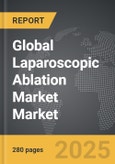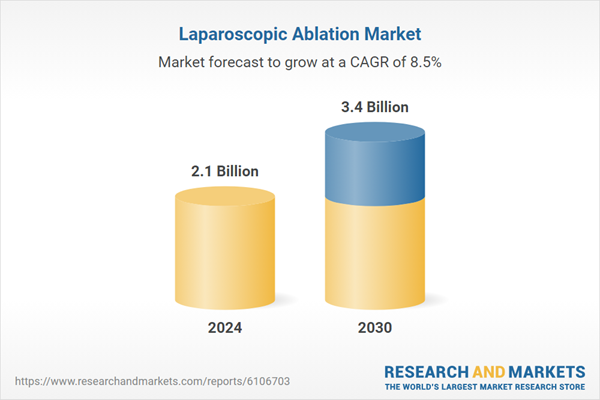Global Laparoscopic Ablation Market - Key Trends & Drivers Summarized
Is Minimally Invasive Technology Redefining Surgical Oncology?
Laparoscopic ablation has emerged as a critical advancement in the field of minimally invasive surgery, particularly within surgical oncology and chronic disease management. This technique involves the destruction of abnormal tissues, such as tumors or endometrial lesions, using heat, cold, or chemical agents delivered via laparoscopic tools. As opposed to open surgery, laparoscopic ablation provides a safer and less traumatic route to treatment, significantly reducing recovery time, hospital stays, and post-operative complications. A defining trend in this space is the integration of high-definition imaging and precision-guided instruments that enable surgeons to target tissue with exceptional accuracy, even in anatomically challenging areas. The technique has gained ground in procedures involving the liver, kidneys, lungs, and reproductive organs, where traditional resection methods pose significant risks or logistical constraints. In gynecology, for instance, laparoscopic ablation is frequently used to treat endometriosis and uterine fibroids with less disruption to reproductive function. With patient demand growing for less invasive treatment alternatives, hospitals are rapidly upgrading surgical infrastructure to accommodate laparoscopic technologies. Furthermore, increasing physician familiarity and procedural training availability have contributed to the steady adoption across secondary and tertiary care centers. In tandem, advancements in real-time monitoring and thermal mapping during ablation enhance procedural safety and effectiveness, reinforcing laparoscopic ablation's clinical value.Why Is Precision and Personalization Driving Adoption in Modern Operating Rooms?
A key factor driving the popularity of laparoscopic ablation lies in its alignment with precision medicine and personalized treatment pathways. Unlike one-size-fits-all surgical approaches, this technique allows clinicians to tailor interventions based on lesion size, location, and patient-specific risk factors. For oncology patients, especially those with early-stage or inoperable tumors, laparoscopic ablation offers a viable therapeutic option that preserves organ function and reduces systemic stress. Radiofrequency ablation (RFA), microwave ablation (MWA), and cryoablation are among the commonly used modalities, each selected based on detailed diagnostic imaging and histopathological profiles. Technological progress has also led to the miniaturization of ablation probes and the enhancement of laparoscopes with 3D visualization, allowing complex procedures to be conducted with greater confidence and precision. Additionally, intraoperative guidance using ultrasound and other imaging aids helps clinicians minimize collateral damage to surrounding tissues. This level of surgical control aligns with growing patient preferences for targeted treatments with fewer side effects. Regulatory approvals and continuous clinical trials are expanding the range of conditions and anatomical sites that can be treated laparoscopically, including early liver metastases, renal cell carcinoma, and even select pancreatic lesions. The evolving procedural landscape is also encouraging multidisciplinary collaboration between surgeons, radiologists, and anesthesiologists to refine outcomes and extend indications. As the focus on outcome-based healthcare intensifies, the role of personalized laparoscopic ablation is only expected to grow.Can Cross-Sector Innovation Bridge Clinical Efficacy and Cost Efficiency?
The intersection of medical technology, engineering, and digital health is transforming laparoscopic ablation into a more accessible and economically viable solution. One of the most exciting developments is the integration of robotics with laparoscopic ablation, improving ergonomics for surgeons and extending reach and precision during interventions. Robotic-assisted laparoscopic ablation has been particularly impactful in urologic and gynecologic procedures, enabling more stable probe placement and better navigation in confined anatomical regions. Additionally, the convergence of artificial intelligence and machine learning with surgical planning tools is helping identify optimal ablation zones and predict tissue response more accurately. These predictive models reduce procedural variability and improve the consistency of clinical outcomes. From an economic perspective, the shorter recovery periods and reduced need for post-operative care make laparoscopic ablation a cost-effective alternative for healthcare systems under pressure to optimize resource utilization. Medical device manufacturers are also playing a key role by developing multi-functional ablation systems that integrate with standard laparoscopic setups, thereby reducing the need for specialized infrastructure. Furthermore, cloud-based data management and analytics platforms are being used to gather and evaluate procedural data, driving continuous improvement in technique and device performance. These innovations collectively ensure that laparoscopic ablation is not just a clinical option, but a scalable, repeatable solution that aligns with both healthcare provider goals and payer expectations in value-based care models.What Is Driving the Growth in the Global Laparoscopic Ablation Market?
The growth in the global laparoscopic ablation market is driven by several factors closely tied to advancements in surgical instrumentation, evolving patient preferences, and changing disease profiles. Technological innovation remains the cornerstone, with ongoing improvements in thermal ablation devices, visualization systems, and image-guided laparoscopes boosting procedural accuracy and patient safety. The rising prevalence of cancer, particularly hepatic, renal, and gynecologic malignancies, is creating a sustained demand for minimally invasive therapeutic options that reduce surgical burden while ensuring effective treatment. Increasing incidence of benign yet symptomatic conditions such as endometriosis and uterine fibroids is further supporting market expansion, especially among younger patients seeking fertility-preserving options. There is also a significant shift in patient attitudes, with more individuals actively seeking out less invasive treatment paths that offer quicker recovery, minimal scarring, and reduced opioid use. Healthcare providers are responding by investing in laparoscopic capabilities and training more surgeons in advanced ablation techniques. Reimbursement reforms in developed markets, along with government-supported surgical modernization programs in emerging economies, are improving patient access and encouraging hospital adoption. In addition, the proliferation of outpatient surgical centers equipped with advanced laparoscopic systems is facilitating faster procedural throughput and broadening the market base. These demand- and supply-side dynamics, coupled with ongoing clinical research and commercial innovation, are collectively propelling the global laparoscopic ablation market into a phase of accelerated growth.Report Scope
The report analyzes the Laparoscopic Ablation market, presented in terms of market value (US$). The analysis covers the key segments and geographic regions outlined below:- Segments: Technique (Radiofrequency Ablation Technique, Microwave Ablation Technique, Cryoablation Technique, Other Techniques); Application (Cancer Application, Cardiovascular Procedures Application, Urological Procedures Application, Gynecological Procedures Application, Other Applications).
- Geographic Regions/Countries: World; United States; Canada; Japan; China; Europe (France; Germany; Italy; United Kingdom; Spain; Russia; and Rest of Europe); Asia-Pacific (Australia; India; South Korea; and Rest of Asia-Pacific); Latin America (Argentina; Brazil; Mexico; and Rest of Latin America); Middle East (Iran; Israel; Saudi Arabia; United Arab Emirates; and Rest of Middle East); and Africa.
Key Insights:
- Market Growth: Understand the significant growth trajectory of the Radiofrequency Ablation Technique segment, which is expected to reach US$1.4 Billion by 2030 with a CAGR of a 6.5%. The Microwave Ablation Technique segment is also set to grow at 10.6% CAGR over the analysis period.
- Regional Analysis: Gain insights into the U.S. market, valued at $574 Million in 2024, and China, forecasted to grow at an impressive 12.9% CAGR to reach $731.5 Million by 2030. Discover growth trends in other key regions, including Japan, Canada, Germany, and the Asia-Pacific.
Why You Should Buy This Report:
- Detailed Market Analysis: Access a thorough analysis of the Global Laparoscopic Ablation Market, covering all major geographic regions and market segments.
- Competitive Insights: Get an overview of the competitive landscape, including the market presence of major players across different geographies.
- Future Trends and Drivers: Understand the key trends and drivers shaping the future of the Global Laparoscopic Ablation Market.
- Actionable Insights: Benefit from actionable insights that can help you identify new revenue opportunities and make strategic business decisions.
Key Questions Answered:
- How is the Global Laparoscopic Ablation Market expected to evolve by 2030?
- What are the main drivers and restraints affecting the market?
- Which market segments will grow the most over the forecast period?
- How will market shares for different regions and segments change by 2030?
- Who are the leading players in the market, and what are their prospects?
Report Features:
- Comprehensive Market Data: Independent analysis of annual sales and market forecasts in US$ Million from 2024 to 2030.
- In-Depth Regional Analysis: Detailed insights into key markets, including the U.S., China, Japan, Canada, Europe, Asia-Pacific, Latin America, Middle East, and Africa.
- Company Profiles: Coverage of players such as Babbel, Berlitz Corporation, Busuu, Drops, Duolingo and more.
- Complimentary Updates: Receive free report updates for one year to keep you informed of the latest market developments.
Some of the 34 companies featured in this Laparoscopic Ablation market report include:
- Ablative Solutions Inc.
- AngioDynamics, Inc.
- Applied Medical
- Apollo Endosurgery
- AtriCure, Inc.
- Boston Scientific Corporation
- CONMED Corporation
- Cook Medical
- EDAP TMS S.A.
- Erbe Elektromedizin GmbH
- Ethicon (Johnson & Johnson)
- IceCure Medical Ltd.
- InSightec Ltd.
- Intuitive Surgical
- Johnson & Johnson
- KARL STORZ SE & Co. KG
- KeyMed (Nanjing) Sci-Tech Co., Ltd.
- Medtronic Plc
- Olympus Corporation
- Richard Wolf GmbH
This edition integrates the latest global trade and economic shifts into comprehensive market analysis. Key updates include:
- Tariff and Trade Impact: Insights into global tariff negotiations across 180+ countries, with analysis of supply chain turbulence, sourcing disruptions, and geographic realignment. Special focus on 2025 as a pivotal year for trade tensions, including updated perspectives on the Trump-era tariffs.
- Adjusted Forecasts and Analytics: Revised global and regional market forecasts through 2030, incorporating tariff effects, economic uncertainty, and structural changes in globalization. Includes historical analysis from 2015 to 2023.
- Strategic Market Dynamics: Evaluation of revised market prospects, regional outlooks, and key economic indicators such as population and urbanization trends.
- Innovation & Technology Trends: Latest developments in product and process innovation, emerging technologies, and key industry drivers shaping the competitive landscape.
- Competitive Intelligence: Updated global market share estimates for 2025, competitive positioning of major players (Strong/Active/Niche/Trivial), and refined focus on leading global brands and core players.
- Expert Insight & Commentary: Strategic analysis from economists, trade experts, and domain specialists to contextualize market shifts and identify emerging opportunities.
Table of Contents
Companies Mentioned (Partial List)
A selection of companies mentioned in this report includes, but is not limited to:
- Ablative Solutions Inc.
- AngioDynamics, Inc.
- Applied Medical
- Apollo Endosurgery
- AtriCure, Inc.
- Boston Scientific Corporation
- CONMED Corporation
- Cook Medical
- EDAP TMS S.A.
- Erbe Elektromedizin GmbH
- Ethicon (Johnson & Johnson)
- IceCure Medical Ltd.
- InSightec Ltd.
- Intuitive Surgical
- Johnson & Johnson
- KARL STORZ SE & Co. KG
- KeyMed (Nanjing) Sci-Tech Co., Ltd.
- Medtronic Plc
- Olympus Corporation
- Richard Wolf GmbH
Table Information
| Report Attribute | Details |
|---|---|
| No. of Pages | 280 |
| Published | January 2026 |
| Forecast Period | 2024 - 2030 |
| Estimated Market Value ( USD | $ 2.1 Billion |
| Forecasted Market Value ( USD | $ 3.4 Billion |
| Compound Annual Growth Rate | 8.5% |
| Regions Covered | Global |









